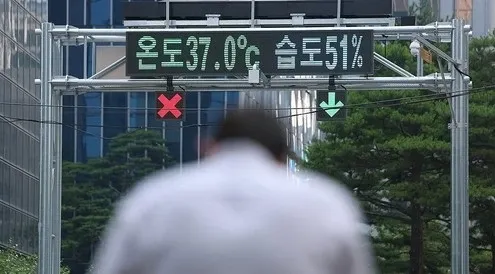Could Seoul's temperature of 37.7 degrees Celsius be the hottest day in 117 years?

Synopsis
Key Takeaways
- Seoul reached 37.7 degrees Celsius on July 8, 2023, a historical record.
- Temperatures exceeded 40 degrees Celsius in Paju and Gwangmyeong.
- Numerous cities across South Korea set new early July temperature records.
- The national average temperature for the first week of July was 28.1 degrees Celsius.
- The heatwave is expected to persist until mid-July.
Seoul, July 8 (NationPress) The temperature in Seoul surged to 37.7 degrees Celsius at approximately 3 p.m. (local time) on Tuesday, marking the highest temperature ever documented for early July in South Korea's capital since record-keeping commenced in 1908, according to the national weather agency.
This new record surpasses the previous high of 36.8 degrees Celsius set on July 9, 1939, breaking an 86-year-old record for the initial 10 days of July in Seoul.
It signifies the hottest day in Seoul for early July in 117 years since temperature data collection began in 1908, the agency highlighted. In addition to Seoul, numerous cities across the nation also recorded new high temperatures for early July, including Incheon at 35.6 degrees Celsius, Wonju in Gangwon Province at 35.4 degrees Celsius, Suwon in Gyeonggi Province at 35.7 degrees Celsius, Cheongju in North Chungcheong Province at 35.7 degrees Celsius, Daejeon at 36.3 degrees Celsius, Gochang in North Jeolla Province at 35.8 degrees Celsius, and Busan at 34.5 degrees Celsius, as reported by the weather agency.
The oppressive heat may slightly lessen on Friday; however, it is expected to return later due to the influx of hot, humid air from the south, the agency indicated.
In the border city of Paju and Gwangmyeong, just south of Seoul, temperatures exceeded 40 degrees Celsius. This event marks the first occurrence of temperatures surpassing 40 degrees Celsius in July, according to Yonhap news agency.
The heat wave is projected to continue until some rainfall is anticipated in the capital area and western Gangwon Province around July 16, as mentioned by the agency.
Seoul has also experienced its ninth consecutive tropical night from Monday to Tuesday.
As per the weather agency, the national average temperature, excluding Jeju Island in the south, during the first week of July was 28.1 degrees Celsius, the highest figure recorded since monitoring began in 1973.










